Episode 5
The Merits and Demerits of Processes
We consider some age-old questions: Do processes help you move faster in business or create rigidity that slows you down? Should you always do certain tasks the same way or should you be flexible? Spoiler alert: Our answer is yes.
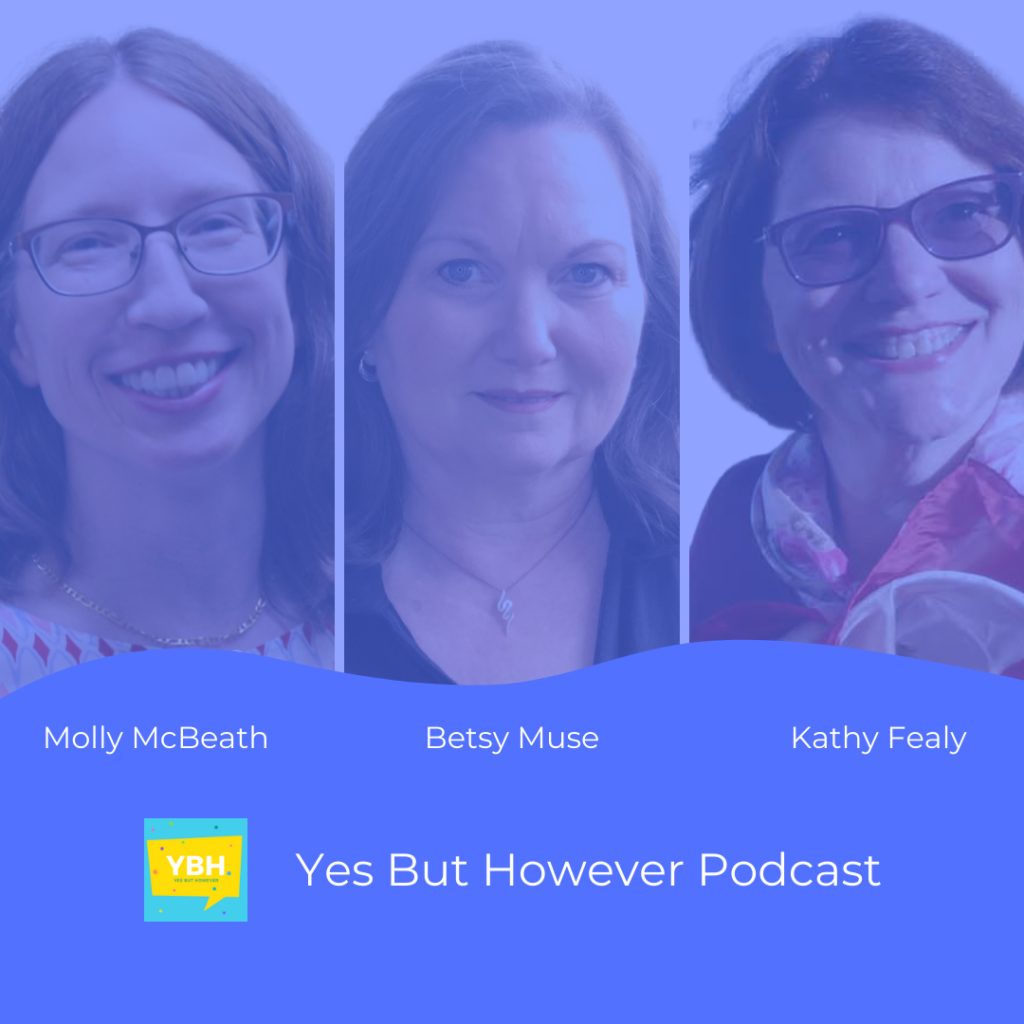
About this Episode
In this episode we consider some age-old questions:
Do processes help you move faster in business or create rigidity that slows you down?
Should you always do certain tasks the same way or should you be flexible? Spoiler alert: Our answer is yes.
People... Products... Places
In this episode, we mention the following:
Transcript
Kathleen Fealy 0:18
Imagine enjoying coffee or cocktails, as you sit around friends, talking with top marketers and inspiring entrepreneurs, about the challenges and joys of business in life. That’s what we do. Each week on Yes But However podcasts. When we’re not interrupting each other.
Molly McBeath 0:37
Woke up super early. And then we look at each other like I really would like to go back to sleep… but we can’t. So I collapsed at like nine o’clock I’m like a really little old lady now and I just collapse. Other than that I’m fine.
Kathleen Fealy 0:58
Betsy, How are you?
Betsy Muse 1:02
Well, you know, I’m having a wonderful week. I’ve had a lot of great client interactions this week now.
Molly McBeath 1:08
Had any processes?
Kathleen Fealy 1:12
That’s a subtle way to do the intro,
Molly McBeath 1:15
Do you like my segway?
Betsy Muse 1:16
That segway needs to stay in.
Kathleen Fealy 1:20
Hello and welcome to yes but however, a podcast about marketing business and real life and how those things, often do not go as planned. In today’s episode, we’re gonna be talking about processes, do they work and, are they right for everybody.
Betsy Muse 1:40
How do we introduce processes?
Molly McBeath 1:43
Well, this was actually I think Kathy’s original suggestion.
Kathleen Fealy 1:48
Yes, I’m guilty. I’m guilty on this one. I’m guilty a lot.
Molly McBeath 1:52
Seems yes, you are. So here I am, I’m holding you accountable. But I am curious you where the inspiration to talk about the merits of having a process.
Kathleen Fealy 2:04
I was creating checklists and putting together, processes, basically, it was like creating ways to do something, so that people would have repeatable steps and have a way to like, check to see if they were doing everything in the right order so they didn’t have to redo things or reinvent the wheels of, you know, different parts of the process, or the project. And I think that it also came up because I realized that I ran my business better when I had specific processes in place. And for many years I resented having to put together processes and probably resisted doing so. And so, I’m still not great at it. As far as I know there’s some people’s whose minds just worked away I’m very much of a visual person. But, um, I think I’m interested to hear how you guys what you think of when you hear the word, you should have a process. And I’m also interested to hear a bit about how you go about putting together a process because I think because I’m a very visual person. I may have a different way of approaching it than you both might. So, Molly, I’ll turn to you. I know you’re from our conversations you seem to be a little more analytical than I am. So I was sort of interested in what, maybe you and Betsy.
Molly McBeath 3:36
I’m super analytical. Um, it was really, it’s really interesting to me to listen to you talking about kind of embrace processes. As you have gotten more experience running a business running a business longer because I think that there’s part of that that I recognize in myself as well that I think when I was younger I definitely resisted having a process. And now there’s a lot more comfort in it. Because I know that will save me time and energy. And so I’m trying to figure out ways to incorporate processes. Almost as often as possible. But what do I think of when somebody says you should have a process. I’m a natural rebel so that kind of, I think that would probably rubbed me the wrong way, but on the other hand, I’m getting wrapped tied up in this, and wrapped around this idea of the thing about recipes. If you’re not really certain about how to make a particular dish. You need to follow those. And then once you’ve been working with that kind of meal. It was quite a bit, you can play around with it a lot more. And in some ways I think processes are like that but sometimes you need that structure because I don’t know what you’re doing enough to figure out what you can play with. And then once you get really comfortable with you don’t really need the process anymore, but maybe it’s just because the process is still there.
Kathleen Fealy 5:20
I agree with you, as far as that processes can be adaptive etc. And I think, easier if it’s just for you that you created the process. If you’re creating a process and you’re going to have to hand it off to someone, you really do need that recipe because you don’t know their skill in the kitchen, so to say, if you’re reading the rest of the analogy, you know, I know for a fact that if I’m looking at a recipe and my husband’s looking at the recipe. Even if we both follow it exact, it’s going to still have a little bit of differences, but I can guarantee that if you did take that recipe away for me, my husband’s is going to come out much better than mine will. I like the fact that you have a little more flexibility in your processes and I, what I’m doing for myself I definitely do, but if you are working on a team with people like sometimes when I go into a project I’m working with the design team I’m working with a marketing team and maybe a sales team. And if they’re all involved it helps for them to see what the process is so that they see what the steps are so they understand those so when they have to be involved.
Molly McBeath 6:31
Right. Exactly.
Kathleen Fealy 6:33
So it’s sort of like a roadmap, in a way that’s been quiet so far so you’ve been really good about not letting us not interrupt over top of each other. So, let’s bring you into the conversation.
Unknown Speaker 6:44
Well my processes exist to keep me on track. And I have processes for every part of my business from a process for writing landing pages, a process for writing sales pages, and then just an overall process for operating my business on a daily and weekly basis. So processes for me are extremely important. They keep me from wasting time, I’m not saying I don’t waste time I’m gonna say that they are they’re I would waste a whole lot more if I didn’t have them. I even have a process for setting up my calendar each week, so that I make sure that in all of my planning and yes I do use paper notebooks, special one for each business and project that I’m working on. But everything that is planned out as I’m sitting on my porch in my rocking chair having a glass of wine with my feet up. I can’t do that with my iMac in front of me, but every while I’m doing my planning, everything was brought forward onto my main calendar, you know, this is something that I go through every single week. And it works for me. I’ve got theme days are part of my process, each theme day has a process to it and has a flow to it. So, I absolutely live and die by processes, and will I evaluate them pretty consistently, as I’m going through them and as I learn new things. And while I don’t have an employee in my business right now I know that the only way I’d be able to hire someone and pass off a task would be if I have that process, written down, and in a formal way.
Kathleen Fealy 8:28
Did they get to get the pretty notebook.
Betsy Muse 8:30
Probably no, they have to find their own notebook.
Molly McBeath 8:34
But the interesting thing is that having a process is a way of managing me my pain points. That’s really what it is for me it’s giving me a framework, I can go in and out of something that might be difficult to go in and out of. If I have a process for it I haven’t easy jumping off point or ramp in or however you know whatever metaphor you want to use. So that’s where I think I did see the value. When I was younger, and that’s what I learned to recognize in my later years of business.
Kathleen Fealy 9:12
What your head is saying you want, don’t worry.
Molly McBeath 9:17
I think it depends on what my blood is. The other thing that I really like about a process, and I don’t know how this relates to aging, is that they keep me from forgetting. Because if I’m, if I get into something that you know is a big complicated project. Having a process for it makes sure that all the details is done.
Betsy Muse 9:39
Right. I can give an example of that because, as you guys know, I was part of the summit, this past winter, and the thing about having a summit is you have to you have to work with speakers, and we were working with more than 45 speakers. The process of onboarding the speakers had multiple steps, they were I wrote them down. And I made sure that each of them flowed and while there were improvements that could be made this was our very first time having that process and making sure that when you know after someone applied and went through the same steps in the same order, each time. Having that process for onboarding the speakers and having it written down really helped streamline it. Even though, being on this side of it looking back, it doesn’t feel like it was a streamline because we were doing it in a short timeframe, I, I like what Molly said about it keeps me from forgetting where I am in the process. You know how you told to retrace your steps if you’ve forgotten something that’s kind of what the process does for me.
Kathleen Fealy 10:45
It’s like having a checklist is really helpful. I think that checklists allow for you to be able to have processes and how quickly. You don’t have to like be sitting out there, writing a ton of stuff or become a document, so to speak, or anything. It can be something really easy, even just something, a process that I adapted when we were going to be doing more and more of these recording podcasts. Plus, making sure my phone was set on Do Not Disturb, making sure I have the mic tested the lights up, etc there because it saves time and it’s nice to everyone’s while had that little checklist to look at because it, you know, if I can, because as we asked we talked about this is real life. I try to move my cats out of the room if I possibly can ahead of time. Otherwise, every once in a while, is that you will be hearing the house in the background this my cat has gotten her toy bird. So now I tried to make sure those kind of things are taking care of. So I think that, you know, people think there’s a word process in my head I think people think oh my god this is gonna be so complicated, but sometimes it’s just as simple as a checklist, or in some cases, I turn on a recorder, like whether it’s, you know, talking to Google Siri, or these names because they’re going to come on, but also like I have a transcription program that I use otter that I can like just talk to it and tell it what I’m doing and how I’m doing things so don’t forget something so it’s really could be very simple to do and that there needs to be a better word than process sometimes.
Molly McBeath 12:24
I think when I was younger, especially I would have heard process and I think I would have interpreted that to be your brain.
And I think that’s why I was resistant and also I think, frankly, I just had less in my brain that. Now I have a lot more in my brain I have a lot more things that I have to track. And so, it’s just a process for this. No, it works. I know it’s taking care of everything. And I don’t have to think about that so I can put my energy into thinking about something more interesting more important, and more urgent.
Betsy Muse 13:08
I do feel like my processes, save me time. And I timed myself out, but I do feel like knowing what comes next, means that I’m not having to flip through these notebooks that you’re teasing me about Kathy. To find what’s next. Now I know what comes next, and I do also have Google Drive folders filled with all of the worksheets and everything else that I use when I’m working with my clients and everything is mapped out in a process there as well so it just, it just, there’s this comfort to it. And whenever I am whenever I stray from my process at all, whether it’s intentional or just something happened and I, I have to jump outside of the normal order of things. I tend to get really frazzled until I can go back and regroup.
Kathleen Fealy 14:09
I think that your real life example of a process besides business is both of your parents. I’m not. But I’ve babysat, a lot. I would go to my friend’s house, and would be ready to take care of her three kids that I was given a list of all of the things that were needed in order to keep those kids safe to tell mom and dad got home. And so I think if you think about the fact that as you go through life. There are certain things that you were taught to do when you diaper a baby. How do you do it. If you are playing baseball with a young girl or boy. Getting the mid on them correctly and helping them learn how to catch the balls there’s like a process that they need to go through. So I think that we’re used to a lot of different processes, it’s just we never knew that that’s what we’re doing.
Betsy Muse 15:03
It’s not what we think about since we’re in business but I think they are. Learn how to tie a shoe there’s a process for doing that you learn how to ride a bike, there’s typically a process for doing that granted it might be different for each person but most of us I remember when I was teaching my girls how to ride their bikes. It’s a process for it usually it involves them walking their bike along until they got the pedals right there where they wanted them in that premium spot so that they can hop on the bike and start pushing right away. So, there are processes. But if we accept processes, every other part of our life Why are we resisting it in business, I mean I was a late comer to processes as important as I said they are to me. I didn’t always have them.
Molly McBeath 15:52
The analogy that I was thinking about earlier was for me. Having processes in my business is like driving my car down a well paved asphalt road versus driving that same regular old car into an open field. I’m still driving the same car but it’s a lot bumpier. And it’s stressful. And it’s probably not good for the car. So I would much rather drive the car on the asphalt. That’s kind of what processes, what I’m learning and processes. So I actually like Betsy I also, I keep notebooks. And I have pages dedicated to certain processes that are sometimes related to software sometimes contract or client onboarding. But the more I learned that I can write it down. The more I can relax around it is one of my favorite phrases. I say this all the time, is it’s a gift to future me. I write something down there it is for me right when I need it I just go and I look it up I pull it out of either computer file or my notebook. And there it is all laid out, written out for me, just the way that I needed it. It’s so nice.
I love it when I remember to be nice to myself.
Betsy Muse 17:34
I don’t know, you’re trying to get over the fact that you would ruin the suspension in your car driving through a field. That’s just me.
Molly McBeath 17:45
Haven’t you ever had some clients where that was kind of what you were doing was ruining the suspension on your business.
Betsy Muse 17:50
Basically,
Molly McBeath 17:52
Kathy said earlier, I don’t have processes that I think are very rigid I do think of them as recipes that once I know the recipe really well. I know how I can play with it. And so, I iterate my processes all the time. And personally, I’m really comfortable that I think it would be different if you’re on a team.
Right. Have a group decision.
Betsy Muse 18:20
That’s very much the same here. Once you know the process once you know what comes next. At least for me, I feel comfortable straying a little bit from it, not completely, but a little bit, it gives me that flexibility. Because I know what brings me back on track. But if I do it unintentionally, or if I’m just kind of haphazard about it, that’s when things kind of go haywire.
Kathleen Fealy 18:49
I was working on a sales funnel for a project that I’m working on. And I realized in some ways it really is the process, because, you know, I need to make sure that x is done. But if y is done, you also have to have 123 and four being taken care of at the same time. I’m very visual so I’m taking my little sticky notes you guys know I do tease you about it. But if you guys came around you would be see that I have the stickies all over the place because then let me paste the wall up with the stickies and then I can go and move everything around and stuff. It really is by the time I’m finished with my sales marketing funnel it’s really a process, because it’s got all the different steps sort of labeled so they don’t forget them.
Molly McBeath
Yeah, Ithink you go with whatever works for you. Yep.
Betsy Muse
Yeah, that’s, it’s. I know that I’ve gone through life and you know maybe we’ll talk about this someday when we’re talking about productivity, but
Kathleen Fealy
I hear a segue coming for a future show.
Betsy Muse
I know that I have tried to organize around the waist someone else does it because they swear by it. And that, I think that’s how I came up with my system, I’ve tried everything else I’ve tried Trello and Asana and Airtable, and I do when I’m collaborating, I do map projects out in a tool because it makes it easier for everyone. I use project co right now but I’ve also used Asana, and different parts of each one appeal to me. So, but I still tend to get overwhelmed with digital project management tools and digital planning. And so going back to the notebooks worked for me. But Kathy it may not work for you.
Kathleen Fealy
May not we’ll have to find out.
Betsy Muse
Oh no, I’m gonna have to go by her notebook,
Molly McBeath
Don’t you have like a stack of them handy.
Kathleen Fealy
Do I have to worry about the Dory of them because we’re going back to a business decluttering conversation that we’ve had,
Molly McBeath
that’s our take on processes and, and their merits. Next week we’ll be on to something completely different. Tune in.
Kathleen Fealy
This has been yes but however I’m Kathy Fealy with my co hosts Betsy Muse and Molly McBeath. This episode was written, edited and produced by the three of us, Our theme music is tourist input economy, which is available through audio here on the show’s website where we post show notes transcripts and more information about us, can be found at Yes But However Podcast dot com. You can contact us through the website or email us at talkers at yes but however podcast.com Thanks for listening.
Unknown Speaker
Now it’s time for the disclaimer. The information opinions and recommendations presented in yes but however offer general information only. Any reliance on the information provided in this podcast is done at your own risk. No part of this podcast should be considered professional advice.
You might also like...
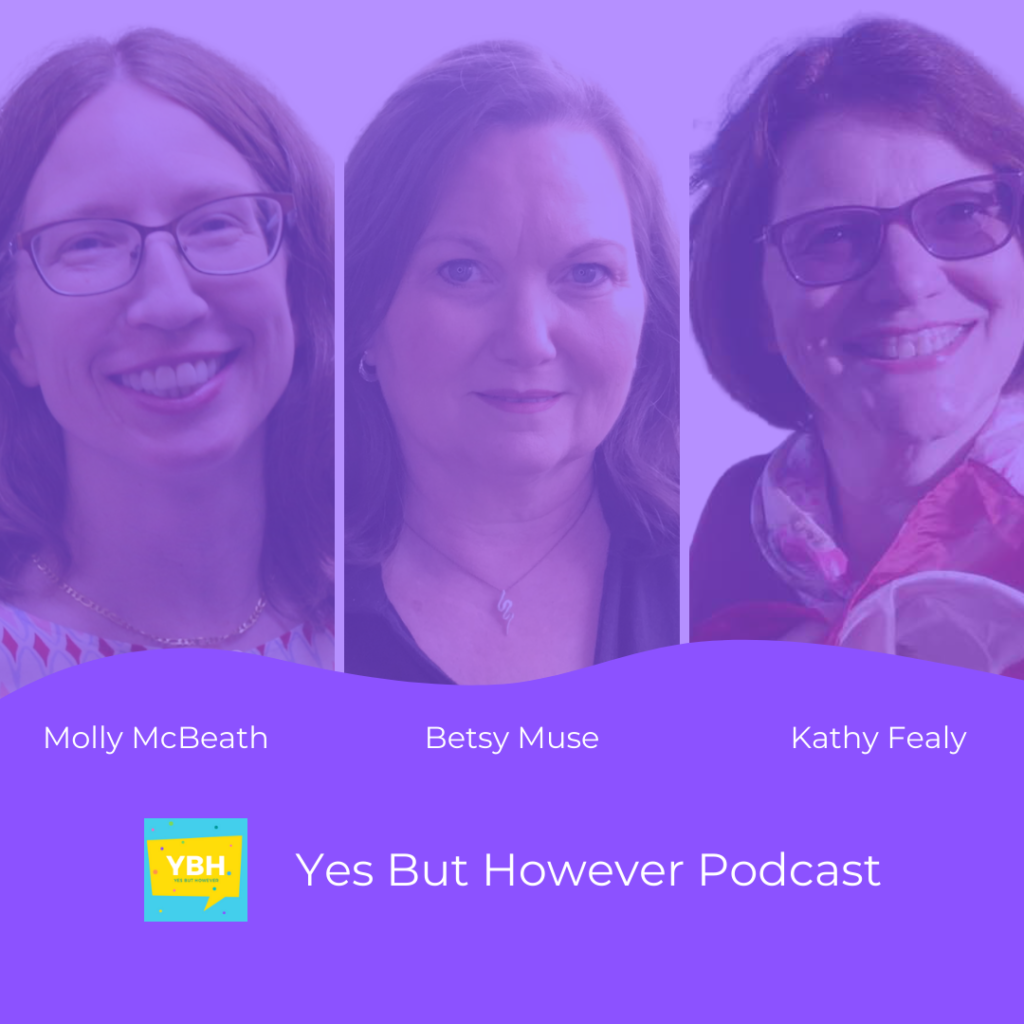
April 2021
Episode 2 - Messaging Mailbox
Marketers get lots of emails, just like everybody else. How we’re different is that we look for the good, the bad, and the ugly in every message we get. In this episode, we delve into our inboxes to see both the good and the problematic ways people try to connect through email.
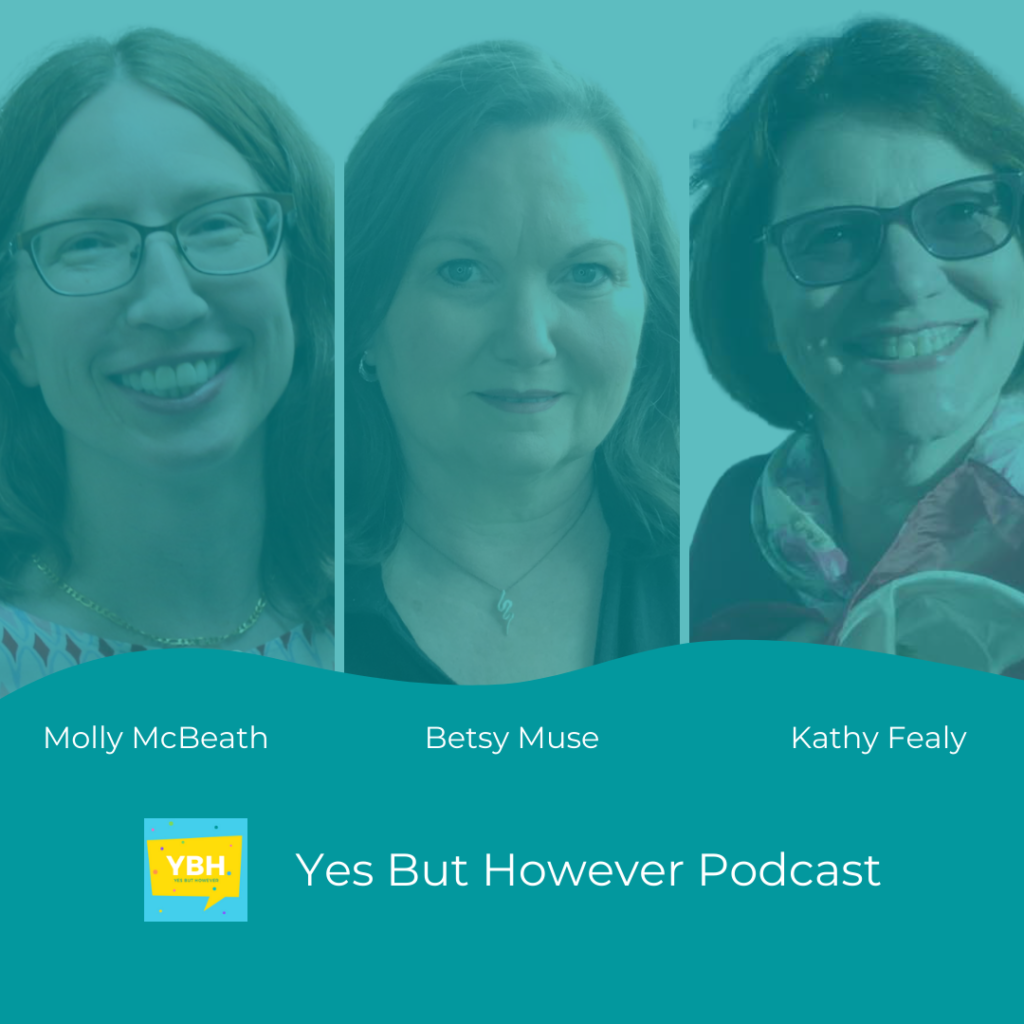
April 2021
Episode 3 - Business Boundaries
Some people love boundaries, some feel caged by them, and some need them to flex like Stretch Armstrong. Kathy, Molly, and Betsy discuss the struggle to create useful boundaries and what works for each of them.
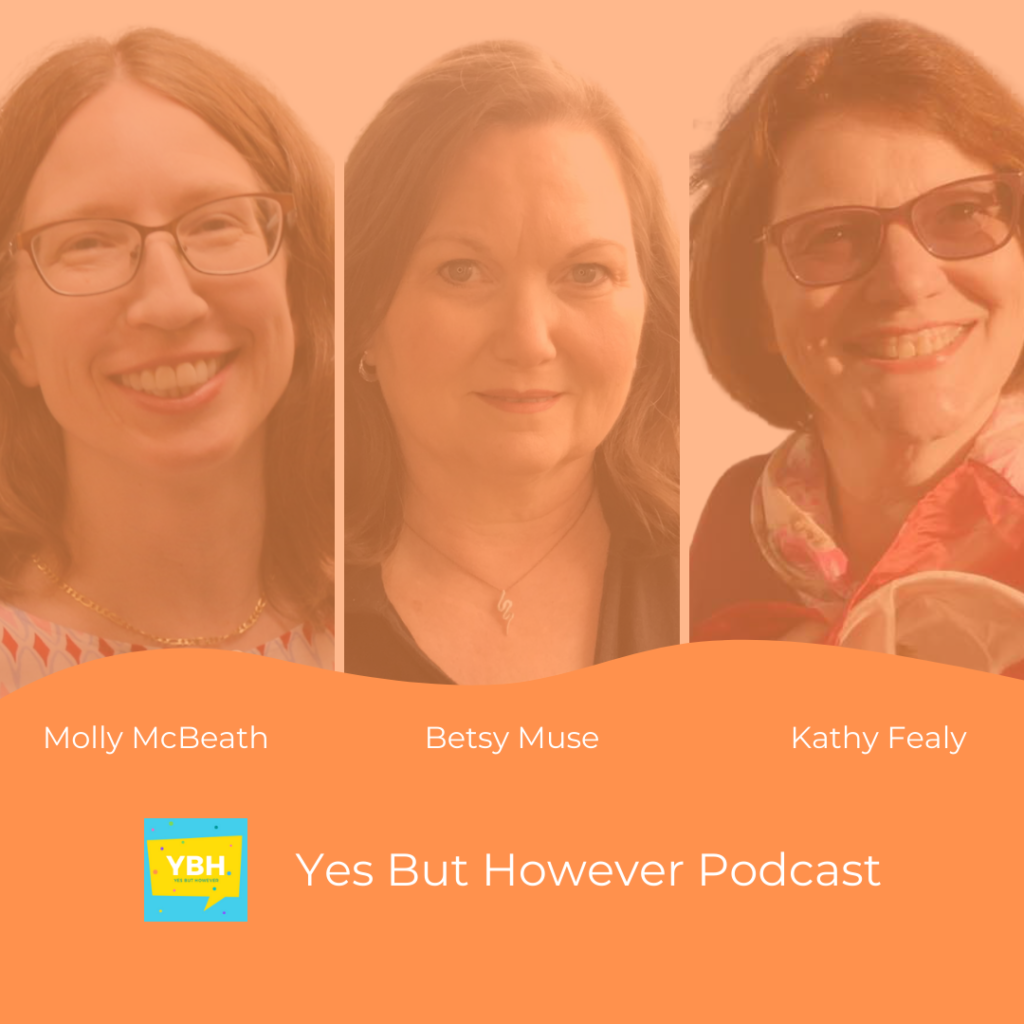
April 2021
Episode 4 - Business Decluttering
Everybody loves a clean desk. But where else in your business are you weighed down, overwhelmed, or disorganized? We talk about all the ways clutter sneaks into your business and how to root it out so you can focus on what really matters.

